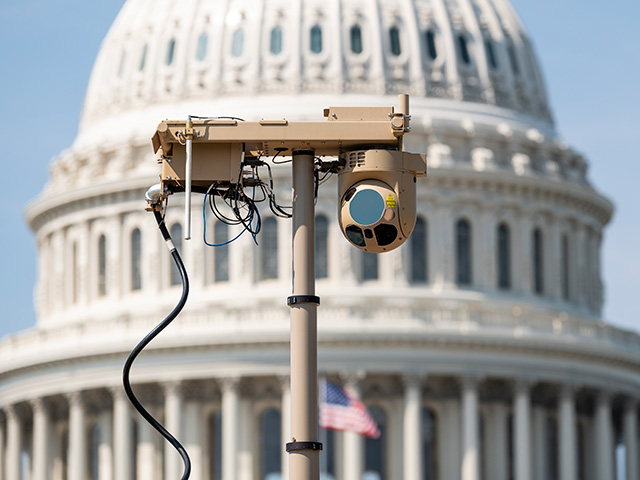Congress faces a chaotic schedule when it returns in the new year. Here are four of the more pressing issues when Congress returns in two weeks.
The year 2023 featured a dramatic 15-vote election to make former Rep. Kevin McCarthy (R-CA) Speaker of the House, a vote to oust McCarthy as Speaker, weeks fighting over who should be Speaker, the election of Rep. Mike Johnson (R-LA) to the speakership, and a contentious fight over reauthorizing Section 702 of the Foreign Intelligence Surveillance Act (FISA).
Not to be outdone, 2024 will start with four dramatic fights over government funding, reauthorizing a government agency, authorizing government surveillance, and resolving partisan issues over Ukraine aid and the border crisis unfolding under President Joe Biden.
1. Multiple spending deadlines and government shutdown fights
Congress has two deadlines January 19 and February 2 for federal government funding. The transportation, housing, and food programs deadline will expire on January 19, while the Departments of Health and Human Services (HHS), Commerce, Labor, and Defense will expire on February 2. Congress must pass either a long-term spending bill or a continuing resolution (CR) or stop-gap spending bill; otherwise, the government will shut down.
2. Federal Aviation Administration (FAA) reauthorization
Congress will have to pass a bill that reauthorizes the FAA by March 8.
House Republicans passed legislation that would reauthorize the agency in July, but the legislation has stalled in the Senate as Congress’s upper chamber has fought over provisions such as pilot training.
The FAA has to be reauthorized every five years; it was last authorized in 2018.

BURBANK, CALIFORNIA – SEPTEMBER 25: A Southwest Airlines take off past the control tower at Burbank Hollywood Airport on September 25, 2023 in Burbank, California. Transportation Secretary Pete Buttigieg is warning that vital training for new air traffic controllers would be paused if the government shuts down later this week. The Department of Transportation currently has 2,600 much needed air traffic controllers undergoing training and employs 1,200 fewer certified controllers than that agency did 10 years ago. (Photo by Justin Sullivan/Getty Images)
Congress hopes to address issues such as as air traffic control, personnel shortages, the pilot retirement age, and even new aircraft such as electric air taxis into the national air space.
3. Section 702 of the Foreign Intelligence Surveillance Act (FISA) reauthorization
Section 702 is a law that allows intelligence agencies to collect communications of targeted foreigners. It also may lead to targeted surveillance of Americans’ private communications, which privacy advocates consider a run around of the Fourth Amendment’s requirement for a warrant to search Americans’ communications.

A video surveillance unit is set up on the East Front of the Capitol as security officials prepare for the Sept. 18th demonstration by supporters of the people arrested in the Jan. 6 riot. The camera surveillance system is on permanent loan from the U.S. Army but will be operated by the Capitol Police to enhance security around the Capitol grounds. (Photo by Bill Clark/CQ-Roll Call, Inc via Getty Images)
The law was meant to expire at the end of 2023, but will now expire on April 19 after congressional leaders included a short-term extension in the National Defense Authorization Act (NDAA).
There are multiple pro-reform proposals that conservatives and progressives have championed, including the Government Surveillance Reform Act, which was sponsored by Sens. Mike Lee (R-UT) and Ron Wyden (D-OR), and the Protect Liberty and End Warrantless Surveillance Act, which was sponsored by Rep. Andy Biggs (R-AZ). Biggs’s bill was advanced out of the House Judiciary Committee.
4. A Ukraine aid and border reform package
President Joe Biden has asked for $111 billion, which would provide $50 billion in security assistance to Ukraine, and $14 billion in aid to Israel during its conflict with Hamas.
Lawmakers had hoped to strike a deal that would provide for Ukraine while providing for border reforms.
Republicans have demanded significant concessions on border policy and enforcement in exchange for aid to Ukraine.
While lawmakers have worked to negotiate a potential border-Ukraine deal, Speaker Mike Johnson (R-LA) has called for Biden to take executive actions to “stem the record tide of illegal immigration. ”

Immigrants line up at a remote U.S. Border Patrol processing center after crossing the U.S.-Mexico border on December 07, 2023 in Lukeville, Arizona. A surge of immigrants illegally passing through openings cut by smugglers in the border wall has overwhelmed U.S. immigration authorities, causing them to shut down several international ports of entry so that officers can help process the new arrivals. (Photo by John Moore/Getty Images)
NBC News reported:
Those executive actions, Johnson said, include ending the policy allowing Customs and Border Protection to release migrants without court dates, and “turnback or detain all aliens encountered between ports of entry”; restricting parole, which allows the president to temporarily admit some migrants; and pursuing agreements with third countries like Canada to take those seeking asylum in the U.S.
Sean Moran is a policy reporter for Breitbart News. Follow him on Twitter @SeanMoran3.


COMMENTS
Please let us know if you're having issues with commenting.